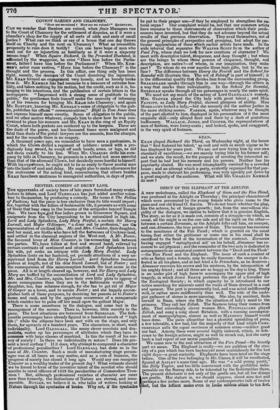COVENT GARDEN AND CHANCERY.
"How are we ruined ? How are we ruined I" OtrIONUNc.
CAN we wonder that theatres are ruined, when ,their Managers run to the Court of Chancery for the settlement of disputes, as if it were a chandler's shop for the supply of all sorts of odds and ends of small 4ustice ? What can we think or say of a house that one day throws Itself on Charity and the next on Chancery? What an irresistible propensity to ruin does it testify! Can one have hope of men who tend out for an injunction as familiarly as if it were a sixpenny mouse-trap? When Squire Richard, in the Provoked Husband, is affronted by the waggoner, he cries "Have him before the Parlia- ment, father have him before the Parliament!" When Mr. KEM- Bm's actor runs restive, "Have him before the Chancery!" is the thought and the process. In this affair, one thing only has been right, namely, the decision of the Court dissolving the injunction. r. lava formed an engagement very loosely, and as loosely broke from it. Mr. KIMBLE has had recourse to a measure of extreme hos- tility, and taken nothing by his motion, but the credit, such as it is, be- longing to his intentions, and the publication of certain letters in the newspapers. "Impressed with a strong sense of gratitude to the public," the gentleman finds himself under the necessity of informing it of his reasons for bringing Mr. KEAN into Chancery ; and again Mr. BARTLEY, knowing Mr. KEMBLE'S sense of obligation to the pub- lic, publishes his official " communications:. Blifil in Toni Jones does not express himself more sweetly. Sense of obligation to the public, and no other motive Whatever, compels him to show how he was con- strained to place his concern and Mr. KEAN in the ring of an Equity Court, where both pockets are rendered up to the lawyers. These are the duels of the purse, and ten thousand times more malignant and fatal than duels of the pistol : lawyers are the seconds, fees the charges, and for the wounds there is no surgery. A thousand years ago, we remember to have seen a pantomime, in ashich the Clown drilled a regiment of soldiers : armed with a pro- digiously long Sword, he swept off such heads, arms, or legs, as did not dress exactly to his line. When Mr. CHARLES drills his com- pany by bills in Chancery, he proceeds in a method not more merciful than that of the aforesaid Clown, but decidedly more hurtful to himself. With his experience, he ought not to be so ready to throw mortal man into the limbcof cost and delay. He ought also to make allowances for the restiveness of the acting kind, remembering that others besides KEAN have been mutinous to managerial authorities, in days of yore.


















 Previous page
Previous page